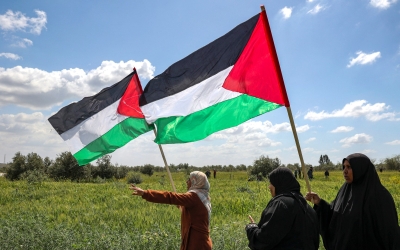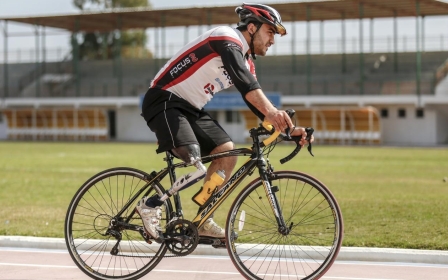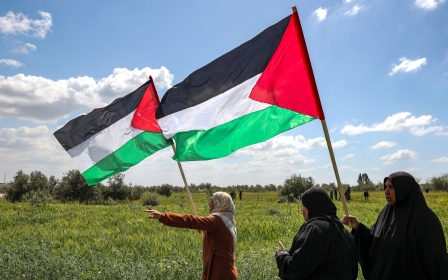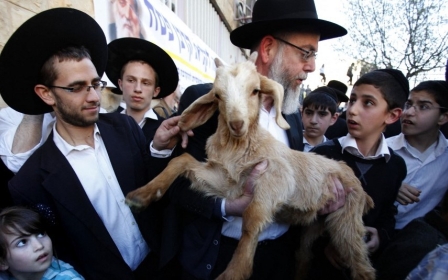Israeli forces fire tear gas during Palestinian final cup match, dozens injured
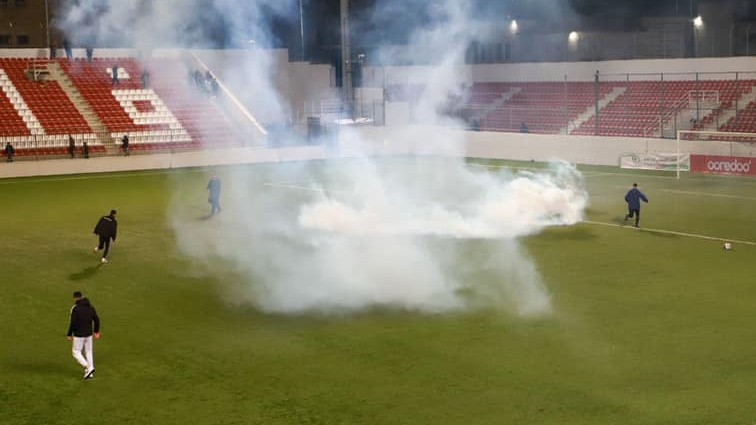
Several Palestinian football players and fans suffered from choking and breathlessness after Israeli forces fired tear gas during a cup final match in occupied East Jerusalem, the Palestinian Football Association (PFA) said.
On Thursday evening, Israeli forces fired tear gas inside Faisal Al-Husseini International Stadium in Dahiat al-Barid street in al-Ram, a town in East Jerusalem.
Several Palestinian football players and dozens of fans, including children, suffered from gas inhalation and were treated on the pitch, while three people were taken to the hospital.
Turkey's General Consul to Palestine Ahmet Riza Demirer, and Jibril al-Rajoub, the president of the PFA, were attending the final of the Abu Ammar Cup on Thursday evening when Israeli forces disrupted the competition.
The PFA said that the assault happened during the halftime break in the match between Markaz Balata, a club from Nablus, and Jabal Al-Mukaber from Jerusalem.
New MEE newsletter: Jerusalem Dispatch
Sign up to get the latest insights and analysis on Israel-Palestine, alongside Turkey Unpacked and other MEE newsletters
"Without prior warning, the occupation soldiers rained gas bombs on the stadium, which fell on the pitch and between the stands, where hundreds of fans, including children, were present," the PFA said.
Fans rushed onto the pitch to get some fresh air. Tear gas is made of chemicals that can cause severe eye and respiratory pain, skin irritation, bleeding, and after long exposure, blindness.
Rajoub said that the Israeli assault was intended to harm the lives of football players and fans.
"I think those are the neo-Nazis. Targeting football players and fans, and firing tear gas on the pitch and the stadium, is a stain in the [Israeli] occupation's face," Rajoub said.
He added that the PFA would file a complaint to FIFA about the incident and communicate the issue with football federations in Asia and worldwide "to put an end to terrorism against sport".
'This is the occupation'
Rajoub said there was no friction or clashes with the Israeli forces, and they were surprised to see tear gas canisters raining on the pitch.
"We believe that this evidence can form the basis for confronting the crimes of the occupation against our people and against Palestinian sports by those neo-Nazis," he told Palestine TV while in the stadium.
The match between Markaz Balata and Jabal Al-Mukaber was nearly called-off, but the referee resumed it after 30 minutes of delay.
Saed Abu Saleem, the goalkeeper and the captain of Markaz Balata, told Palestine TV: "This is the occupation. They want to make life hell for the Palestinian people."
"The fans came to see their team playing, but the occupation does not want a child or an elderly, living a normal life like people around the world," he said.
Abu Saleem said the tear gas had reached their changing room, and some players suffered from its effects.
Hafid Derradji, a journalist and football commentator at BeIn Sport, a pan-Arab sports channel, tweeted that the incident "is another stigma of no less filth than all the inhuman practices to which our proud Palestinian people are subjected".
Some Palestinian fans travelled from faraway cities and towns in the north of the West Bank to watch the match.
The clubs' medical teams and the Palestine Red Crescent treated several fans at the site, some were gasping for fresh air.
Jabal Al-Mukaber won the cup final, 1-0, after Zaid Qunbor scored a header in the 27th minute.
In February, Israeli forces demolished part of the Jenin Football Club during its raids on the city.
In October, an Israeli occupation court sentenced Tariq Al-Araj, a player in the Palestine national team, to four years in prison for belonging to a "banned group" after he was arrested at a military checkpoint in Jenin.
The current Israeli far-right government of Prime Minister Benjamin Netanyahu opposes the establishment of the Palestinian state or the presence of Palestinian Authority (PA) institutions and events in occupied East Jerusalem, which Palestinians remain adamant is their capital city.
Middle East Eye delivers independent and unrivalled coverage and analysis of the Middle East, North Africa and beyond. To learn more about republishing this content and the associated fees, please fill out this form. More about MEE can be found here.


